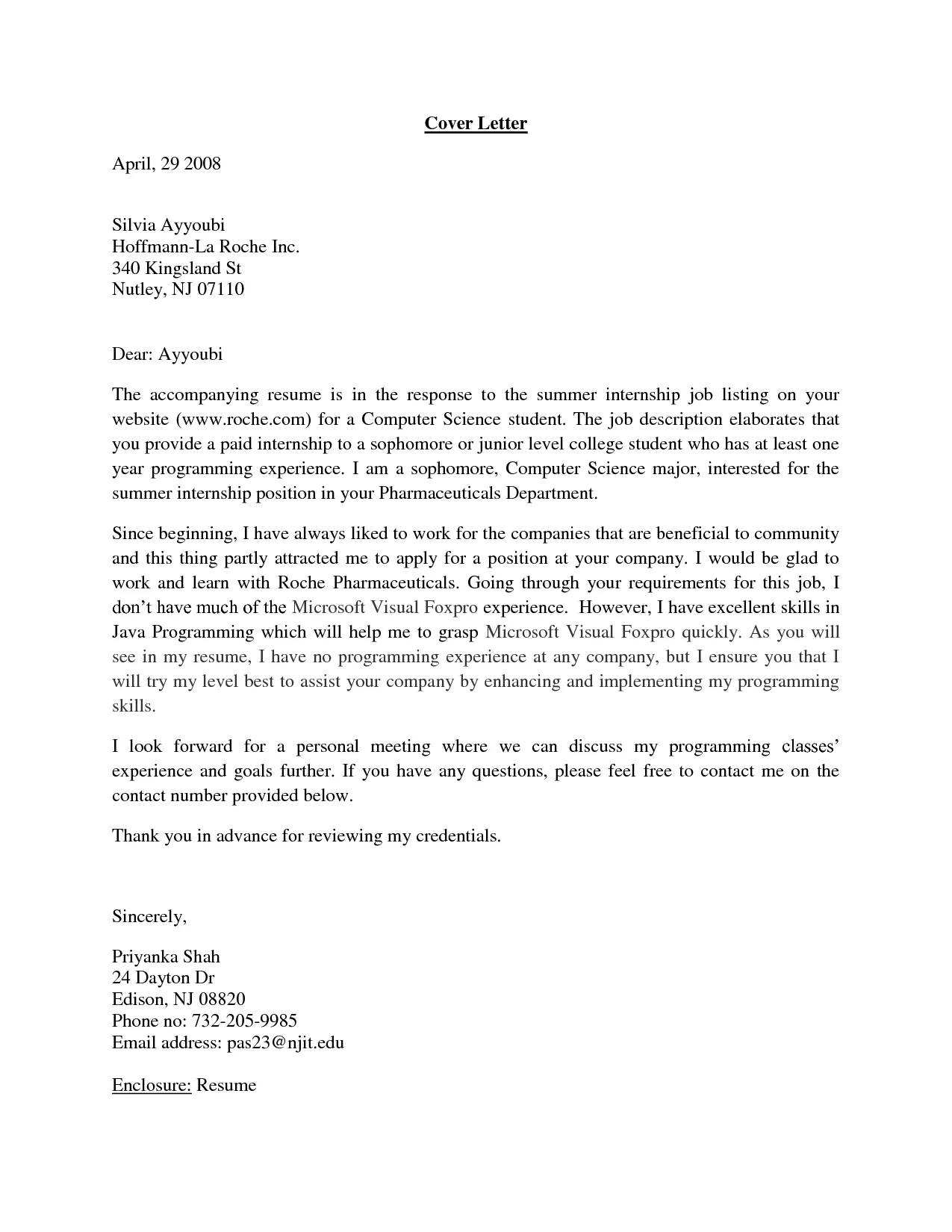Understanding the Importance of a Cover Letter
In the competitive world of computer science, securing an internship is a crucial step toward building a successful career. Your resume is undoubtedly important, but a well-crafted cover letter can be the key that unlocks the door to your dream internship. It is your first opportunity to make a lasting impression on potential employers. It’s your chance to go beyond the bullet points of your resume and show the human side of your application, revealing your passion for computer science and explaining why you’re the perfect fit for their specific program. A strong cover letter demonstrates your communication skills and attention to detail, both of which are highly valued in the tech industry. It helps you stand out from the crowd of applicants, showcasing your unique personality and career aspirations. Without a compelling cover letter, your application may be overlooked, even if your resume is filled with impressive qualifications.
Why a Cover Letter is Crucial for Computer Science Internships
A cover letter is your chance to tell a story. In the highly technical field of computer science, a cover letter allows you to connect your skills and experience to the specific needs of the internship. It enables you to explain how your knowledge of programming languages, software development, or data analysis aligns with the company’s projects and goals. It gives you the opportunity to address any gaps in your resume, such as a lack of direct industry experience, by highlighting your passion, projects, and eagerness to learn. More importantly, it demonstrates your enthusiasm for the specific internship and company. It shows you’ve done your research and are not just sending out generic applications. By tailoring your letter, you prove you’re genuinely interested in their opportunity. It provides a space to showcase your personality and communication style. A well-written letter highlights your ability to convey ideas clearly, a critical skill in any computer science role.
Highlighting Your Skills and Experiences
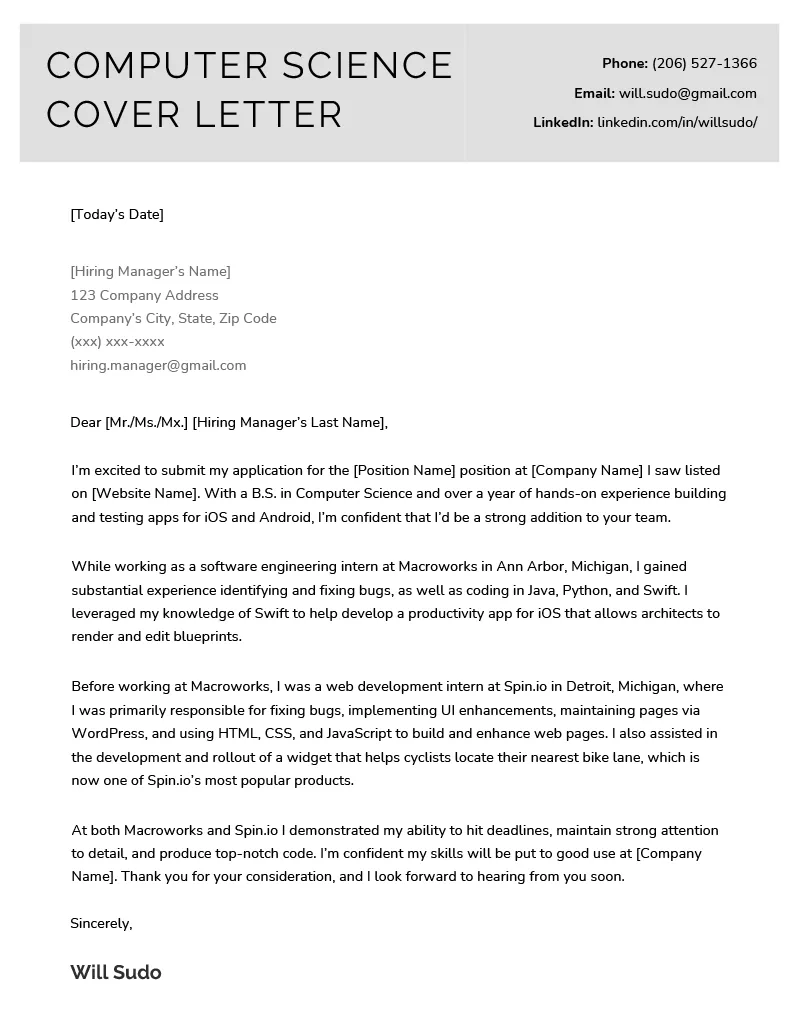
Your cover letter is the perfect place to showcase the skills and experiences that make you a strong candidate. Start by identifying the key skills the internship requires, such as proficiency in specific programming languages (e.g., Python, Java, C++), knowledge of data structures and algorithms, or experience with software development methodologies. Then, provide concise examples of how you’ve applied these skills in previous projects, coursework, or personal endeavors. Quantify your achievements whenever possible. Instead of saying you ‘worked on a project,’ describe the outcome: ‘Developed a web application using Python and Django, resulting in a 20% increase in user engagement.’ Remember to emphasize the skills that align with the internship description. This focused approach helps the hiring manager quickly see the value you bring to their team. Don’t just list your skills; demonstrate them through compelling narratives.
Tailoring Your Cover Letter to the Internship
Generic cover letters are easily spotted and often discarded. A successful cover letter is tailored specifically to the internship you’re applying for. Carefully review the job description and identify the key requirements, responsibilities, and desired qualifications. Then, adjust your letter to reflect how your skills and experiences align with these specifics. Mention the company by name and express your understanding of their mission and values. This shows that you’ve taken the time to research the organization. Use keywords from the job description throughout your cover letter. This helps the hiring manager quickly recognize your qualifications. If the internship focuses on a particular area of computer science, such as artificial intelligence or cybersecurity, highlight your relevant experience and express your interest in that specific domain. By demonstrating your knowledge of the company and the internship’s objectives, you significantly increase your chances of getting noticed.
Researching the Company and Internship
Before you start writing, thoroughly research the company and the internship program. Visit the company’s website to learn about their products, services, and culture. Explore their social media profiles to get a sense of their values and recent projects. Identify the specific department or team you’d be working with and understand their goals. Look for news articles, blog posts, and press releases that discuss the company’s achievements and future plans. This information will help you tailor your cover letter to demonstrate your genuine interest and understanding of the company’s mission. When you have a solid understanding of the company, research the specific internship. Review the job description and understand the tasks and responsibilities. Learn about the team you will be working with, and identify any specific skills or experiences they are seeking. This research will provide you with the information needed to write a targeted and effective cover letter.
Demonstrating Your Technical Skills
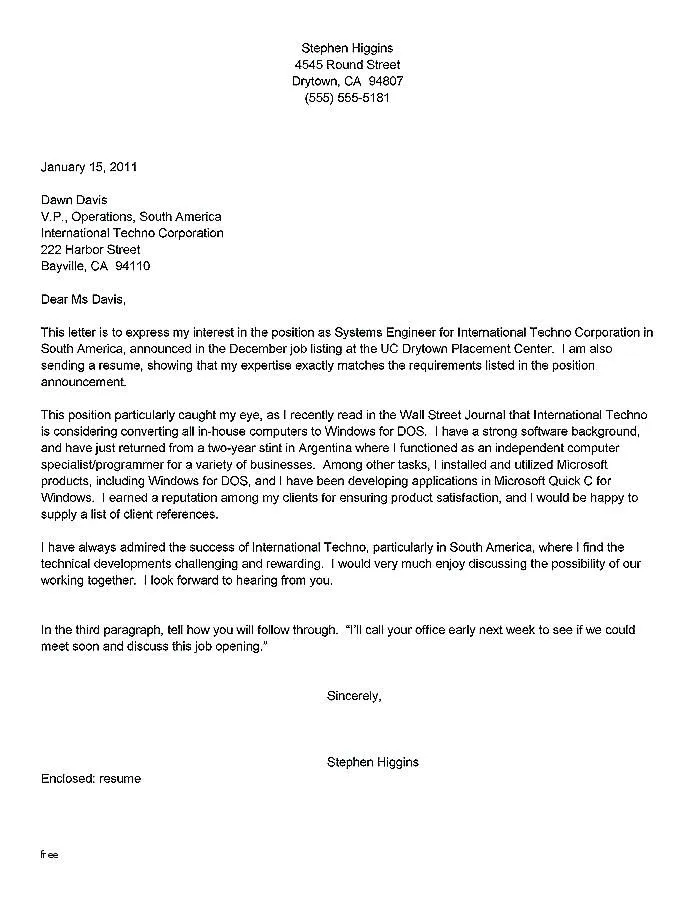
In your cover letter, provide specific examples of your technical skills. Showcase your proficiency in programming languages, such as Python, Java, C++, or JavaScript. If you have experience with software development methodologies, such as Agile or Scrum, mention it and describe how you’ve used these methods in your projects. Provide details about your experience with databases, operating systems, and software tools. If you’ve worked on any personal projects, include a brief description of the project, the technologies you used, and the results you achieved. You can also highlight your experience with data structures and algorithms, machine learning, artificial intelligence, or cybersecurity, depending on the specific internship. By providing concrete examples and quantifying your achievements whenever possible, you demonstrate to the hiring manager that you possess the technical skills required to succeed in the role. Show that you can apply your knowledge to solve real-world problems.
Showcasing Your Soft Skills
While technical skills are essential, soft skills are equally important in the computer science field. Your cover letter is an excellent opportunity to highlight these skills, such as communication, teamwork, problem-solving, and time management. Provide specific examples of how you’ve demonstrated these skills in your projects, coursework, or extracurricular activities. For instance, describe a time when you worked effectively as part of a team to complete a project, mentioning the challenges you overcame and the results you achieved. Mention your ability to communicate complex technical information clearly and concisely, both in written and verbal form. Showcase your problem-solving abilities by describing how you approach challenges and find solutions. If you have experience with project management or time management, highlight it, and demonstrate how you effectively balance multiple tasks and meet deadlines. By highlighting these skills, you demonstrate that you’re not only technically proficient but also a well-rounded candidate who can thrive in a collaborative work environment. Soft skills enhance your ability to work effectively with others.
Structuring Your Cover Letter for Maximum Impact
A well-structured cover letter is essential for grabbing the reader’s attention and conveying your key qualifications. Start with a clear and concise introduction, stating the position you’re applying for and how you learned about it. In the body of your letter, highlight your relevant skills and experiences, using specific examples to support your claims. Organize your content logically, with each paragraph focusing on a specific aspect of your qualifications. Use keywords from the job description to make your letter more relevant to the hiring manager. Ensure that your letter is easy to read, with clear headings, short paragraphs, and bullet points. Keep your letter concise, ideally within one page. End with a strong conclusion that reiterates your interest in the internship and expresses your enthusiasm for the opportunity. Include a call to action, such as requesting an interview. A well-structured cover letter allows you to present your qualifications effectively and makes a positive impression on the hiring manager.
The Introduction Grabbing Their Attention
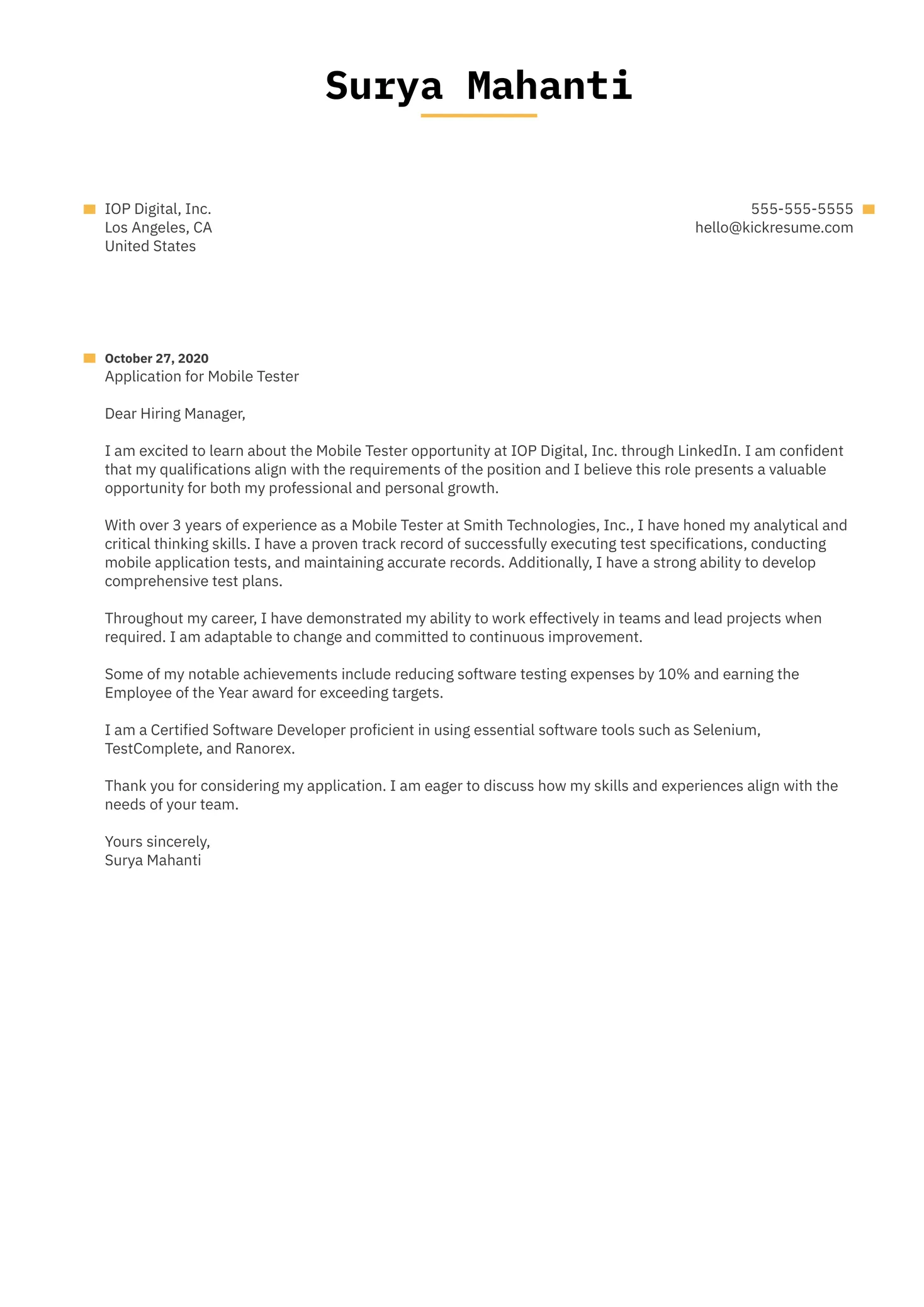
Your introduction is your first and perhaps only opportunity to make a positive impression. Start with a compelling hook that grabs the reader’s attention. Mention the position you’re applying for and where you found the posting. Briefly state your most relevant skills or experiences, and express your enthusiasm for the opportunity. Avoid generic openings like ‘I am writing to express my interest.’ Instead, try a more engaging approach. For example, you could start by mentioning something specific about the company that interests you. You might reference a recent project, their culture, or their mission statement. Briefly mention how your skills align with the internship’s requirements. Keep your introduction concise and focused. The goal is to pique the reader’s interest and encourage them to read the rest of your letter. A strong introduction sets the tone for the rest of your cover letter and makes you stand out from other applicants.
The Body Highlighting Achievements
The body of your cover letter is where you showcase your achievements and demonstrate how your skills and experiences match the internship’s requirements. Use this section to highlight your relevant skills and experiences, providing specific examples to support your claims. Refer to your resume, but go beyond the bullet points. Provide context, explain your role, and describe the results you achieved. Focus on the skills and experiences that are most relevant to the internship. Tailor your examples to the specific requirements of the job description. Quantify your achievements whenever possible. Use numbers and data to demonstrate the impact of your work. For example, ‘Improved the efficiency of the data processing pipeline by 15%.’ Showcase your problem-solving abilities by describing how you approached challenges and found solutions. Provide details of the technology you used and why. The body of your cover letter should tell a story, showcasing how your skills and experiences make you an ideal candidate.
The Conclusion Call to Action
Your conclusion should be a concise and impactful summary of your qualifications and a call to action. Reiterate your interest in the internship and express your enthusiasm for the opportunity. Briefly summarize your key skills and experiences, highlighting how they align with the internship’s requirements. Restate your appreciation for the hiring manager’s time and consideration. Include a call to action. This is your opportunity to request an interview or express your availability to discuss your application further. Keep your conclusion short and to the point. Avoid introducing any new information. Your conclusion should leave a positive and lasting impression, encouraging the hiring manager to take the next step. A clear and professional closing reinforces your interest and increases the likelihood of your application moving forward.
Proofreading and Formatting
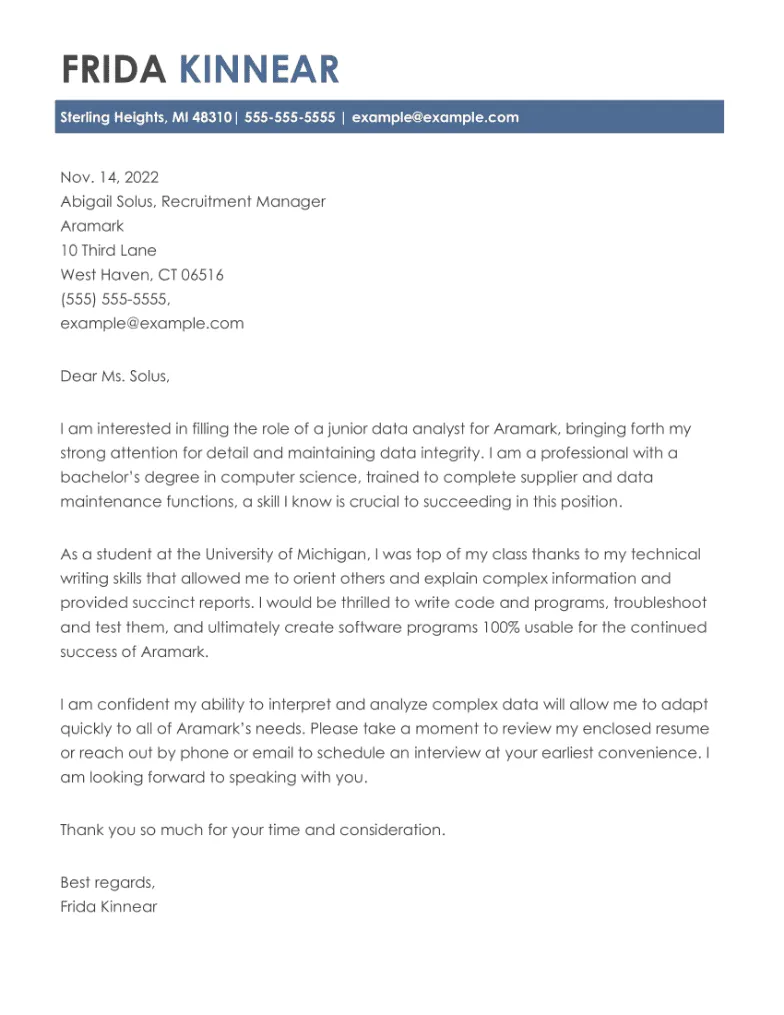
Before submitting your cover letter, proofread it carefully for any errors in grammar, spelling, and punctuation. Typos and grammatical mistakes can undermine your credibility. Use a grammar checker tool to identify and correct any errors. Ensure that your cover letter is well-formatted and easy to read. Use a professional font, such as Times New Roman or Arial, and maintain a consistent font size. Use clear headings and subheadings to organize your content. Keep your paragraphs short and concise. Use bullet points to highlight key skills and achievements. Ensure your letter is properly spaced and that the margins are consistent. Proofread your letter multiple times. Ask a friend, professor, or career advisor to review your letter. They can identify any errors you may have missed. A polished and professional cover letter demonstrates your attention to detail and commitment to excellence, which are crucial qualities for any computer science intern.
Common Mistakes to Avoid
There are several common mistakes to avoid when writing a cover letter for a computer science internship. Avoid using generic cover letters that are not tailored to the specific internship. Don’t simply repeat information from your resume; provide additional context and highlight your achievements. Avoid focusing solely on your skills without providing specific examples of how you’ve used them. Do not use jargon or technical terms that the hiring manager may not understand. Keep your language clear and concise. Avoid using slang or informal language. Don’t include irrelevant information or experiences. Avoid mentioning your salary expectations. Avoid using clichés and overly formal language. Do not submit a cover letter with errors in grammar, spelling, or punctuation. Taking the time to proofread your cover letter is critical. By avoiding these common mistakes, you can significantly increase your chances of writing a compelling cover letter that grabs the hiring manager’s attention and secures you an interview.
Submitting Your Cover Letter
Once you’ve written and proofread your cover letter, it’s time to submit your application. Follow the instructions provided in the job posting carefully. Make sure you submit your cover letter as a PDF file, unless otherwise specified. This ensures that your formatting will remain consistent. When submitting your application online, use a professional and clear file name. Make sure the file name includes your name and the position you’re applying for (e.g., JohnDoe_CoverLetter_CSIntern.pdf). Send your application to the correct contact person. Double-check the email address and make sure you’re addressing the correct individual. Use a professional email subject line (e.g., ‘Application for Computer Science Internship’). Always include a brief and professional greeting in your email. Consider including a brief message in the body of the email. Thank the hiring manager for their time and consideration. By following these guidelines, you increase your chances of a successful application. A well-submitted application demonstrates your attention to detail and professionalism.
